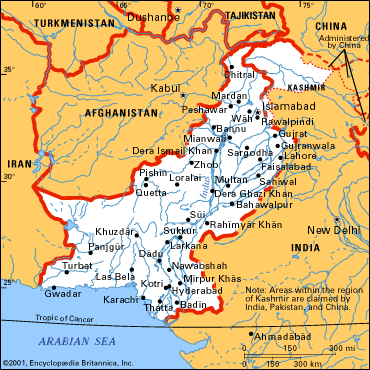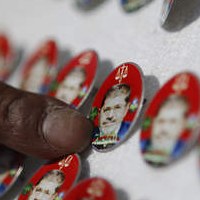![]()
Sat, June 11, 2011 | Rubin Reports | By Barry Rubin
The Myth That Contemporary Western Mass Media Help Understand the World: An Example on Pakistan
People ask me why I write so much and I explain that I don’t want to do so but keep coming across such important events, missed stories, and outrageous nonsense that I feel compelled to say something. So it is in this case.
Here’s the problem: a remarkable amount of what’s written on the Middle East in the mass media — and certainly the efforts to analyze it as opposed to reporting events — is nonsensical. It makes the region harder to understand. It misleads the reader.
An example is Anatol Lieven, “5 Myths about Pakistan,” Washington Post, June 5, 2011. Lieven is a professor at Kings College London and a senior fellow at the New America Foundation. He has just written a book on Pakistan.
One of the techniques often employed in the creation of the Fantasy Middle East is to misstate totally the issues at stake. Note the use of that technique in Lieven’s article.
Alleged Myth One: “Pakistan is a U.S. ally in the war on terrorism.”
Pakistan, he writes, just follows its own interests. Sometimes it’s helpful and sometimes it isn’t. Fair enough, that’s what allies generally do. But the policy question is: whether Pakistan is helpful often enough to merit being treated like an ally and given huge amounts of aid. The answer is ”no.” Neither the question nor the answer is addressed.
Incidentally, it’s pretty outrageous that Lieven suggests that Pakistan supports the Taliban because India is inciting other groups in Afghanistan to seize power. Yet since Pakistan’s policy has been the same for 30 years — it has long supported radical Islamist forces in Afghanistan — how can India be to blame for relatively recent policies? To bash India for Pakistan’s behavior in Afghanistan is absurd.
If a country supports to a major degree the two groups that attacked America on September 11 — the Taliban and al-Qaida — plus is a major sponsor of terrorism against India, the answer to question 1 isn’t “Sometimes” but “Definitely not!”
Alleged Myth 2: “Pakistan is an ally of the Taliban.”
Again, Lieven turns this into a “straw man” argument. Sometimes it is, sometimes it isn’t, he says. But the real answer is “yes,” if one is talking about the Afghan Taliban, which is what the United States is mainly concerned about! It is only an enemy of the [Pakistani] Taliban that tries to take over Pakistan. So, again, Pakistan IS an ally of the [Afghan] Taliban, the group — along with al-Qaida — that the United States gives it billions of dollars to fight against!
Alleged Myth 3: “Islamist revolution is coming to Pakistan.”
Why is this a myth? Because, says Lieven, less than one-fifth of Pakistanis view the Taliban favorably in a poll. As if, that’s the only Islamist group! He cites one Pew poll number but other polls and other questions show a remarkably high level of support for Islamism among Pakistanis. Putting such a spin on one item and leaving out others verges, to put it politely, on deliberate dishonesty.
Indeed, a recent Pew poll shows that Pakistanis support Islamism by a whopping 47 to 15 percent margin. Thus, this argument that Pakistanis don’t want Islamism is a total myth. That’s why Lieven misrepresents the issue to “prove” that Pakistanis don’t want the Taliban’s specific brand of Islamism.
I’m not saying that Pakistan will have a radical Islamist revolution. But it is certainly possible. If Turkey and Egypt can become Islamist, surely Pakistan could do so.
Alleged Myth 4 “Massive U.S. aid lets Washington dictate Pakistani policy.”
This one really made me angry. Nobody seriously argues such a thing. The real issue is whether the large amount of aid and support the United States gives Pakistan provides some American leverage to get Pakistan to do things that the United States wants and needs to be done. If this aid does no good at all then it shouldn’t be given in the first place.
The correct formulation is: “Does giving Pakistan massive aid provide Washington with any ability at all to have the slightest effect on Pakistani policy.” If billions of dollars cannot even get them to help find Usama bin Laden what good are they?
Alleged Myth 5 “Pakistan, not Afghanistan, is the front in the war on terrorism.”
The front? I don’t know anyone who says this either. That’s just a phony issue. The real question is: Does Pakistan provide really positive aid in fighting terrorism or not? But if one frames the question in that way the answer is not likely to be in the affirmative, which is presumably why this question isn’t asked.
So what’s the bottom line? The author writes what he’s been setting up for that entire misleading essay:
“None of this means that the United States should pursue more aggressive policies against Pakistan to win the war on terrorism….Any U.S. action that endangered the stability of the Pakistani government would be insane.”
In other words, U.S. policy is just fine and there’s no need to change anything. Who cares if they support the Taliban, hide al-Qaida leaders, and launch terrorist attacks on India? Just keep sending them money and keep giving them support.
Precisely the same argument has and will be used to rationalize such things as:
U.S. aid and support to the Palestinian Authority (even if it refuses to negotiate or make peace and brings Hamas into the government);
Turkey (despite its regime’s growing support for Iran);
Syria (the regime supposedly wants to reform itself and you can’t expect it to abandon the alliance with Iran so who cares if they shoot down thousands of unarmed citizens and help terrorist groups along with opposing U.S. policies and interests);
Lebanon (even if Hizballah will be in the government and the country is dominated by Syria and Iran);
and no doubt soon Egypt (with a radical nationalist-Islamist regime that will be against the United States.
You can easily adjust the five “myths” to suit each circumstance. Indeed, if Iran’s leaders didn’t keep “stubbornly” refusing to make some phony deal on their nuclear program the Obama administration and many “experts” would no doubt be advocating the same ideas about Iran, too.
Why was that article written? Like so many, to turn something obvious through “sophistication” into a brain-dead conclusion. Let’s state it briefly to make the point stand out:
High-ranking elements in Pakistan have just got caught hiding Usama bin Ladin, the world’s number-one wanted terrorist who killed 3000 Americans on September 11 and have repeatedly been caught helping bin Ladin’s enablers, the Afghan Taliban, and terrorists murdering people in India. No apology, no investigation, no change of policy by Pakistan.
The expert recommendation? U.S. policy toward Pakistan shouldn’t change at all.
This is the foolishness dressed up with deception and double-talk that so often substitutes for serious debate in America’s mass media today.
I would call the kind of article I’m analyzing here not only “misinformation” but ”anti-information.” In other words, the person reading it would be worse informed afterward than they were beforehand!
And the same goes for much — most? Almost all? — of the material of this nature in the mass media. Not only do we face this propaganda barrage but contrary opinions are generally barred from mass media publication or broadcast altogether.
What I’ve done with this article and others can be done with many of the items on the Middle East that appear daily in prestigious publications. It’s not just about getting details wrong, it’s about total misdirection. A few minutes of serious analysis can totally demolish what they are saying while exposing their hidden (wrong) assumptions.
About the author,
Barry Rubin is director of the Global Research in International Affairs (GLORIA) Center, editor of the Middle East Review of International Affairs (MERIA) Journal, and a featured columnist at PajamasMedia http://pajamasmedia.com/barryrubin/ His latest books are The Israel-Arab Reader (seventh edition), The Long War for Freedom: The Arab Struggle for Democracy in the Middle East (Wiley), and The Truth About Syria (Palgrave-Macmillan). The website of the GLORIA Center is http://www.gloria-center.org. His PajamaMedia columns are mirrored and other articles available at http://www.rubinreports.blogspot.com/.



 RSS
RSS












The Myth That Contemporary Western Mass Media Help Understand the World: An Example on #Pakistan | #media #tcot http://j.mp/jI2Soc
The Myth That Contemporary Western Mass Media Help Understand the World: An Example on #Pakistan | #media #tcot http://j.mp/jI2Soc
Mr. Barry Rubin ,
Readin your article, I dont think you have even slightest knowledge of this whole affair of US – Pak relation.
Infact, your references to polls are even wrong and do not provide correct presenation. Those myths about Pakistan you quoted, most of them are really myths.
From:
Tanveer
My source:
I’m a Pakistani national that hates Al Qaida, Taliban and US interventions in Pakistan – that is what 90% of Pakistanis do.